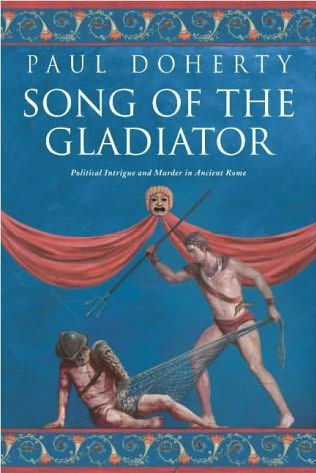The Song of the Gladiator
by Paul Doherty

Reviewed by Coral
Constantine, who history will name the first Christian Emperor of Rome, is not having an easy time of it. Trying to use this new religion to secure his rule of the west he is faced, instead, with a religion divided amongst itself. Two ideologies are fighting for supremacy of this new religion, so the emperor invites Arius and Athanasius - the leaders of these two sects - to his villa to debate the matter. Unfortunelty, once there, one of Arius' people ends up dead. What's worse, a sword holy to the Christians has gone missing from the Imperial family's treasury.
Now it is up to Claudia, spy for Constantine's mother, Helena, to solve these mysteries. Claudia, though, is a little pre-occupied with trying to solve the mysteries in her own life, like who poisoned a popular gladiator her lover Murranus would have had to face in the arena and finding the man with the purple chalice tattoo that attacked and raped her.
I hate it when books set in the past come off feeling too modern. The use of the word boyfriend, for instance. People didn't really date back then like we do now, did they? Also, the saying "get his just deserts", was that really around back then? I highly doubt Claudia would have still been unmarried, as most women were married pretty young in those days. Also, please, let's try to cut down on the foreign sounding words, like the French based feted, can we?
I hated the character of Dacius, minor though he was. The man was a walking stereotype of "effeminate". He swayed, lisped, had painted nails, pouted. The man was a leader of a Roman street gang, he is supposed to be dangerous and deadly. He wasn't the least bit threatening. Ugh, why can't we move past these tired stereotypes?
The characterization of Constantine - drunken buffoon - grated, as did the overly friendly Helena. Somehow I can't really picture the mother of an emperor patting her mercenaries on the head or caressing the hair of her spies. It just seems so false for a ruler - or mother of a ruler - to be overly friendly and touchy with the drones and spies she uses to hold onto power.
Which brings me to Claudia, and how unbelievable she was as a spy. First, we are told Claudia makes a good spy because people don't notice her. Unfortunelty, not only does half Helena's staff know she's a spy, the Empress is always talking to her in public, in a manner more friendly than an empress should have with a maid - which is what Claudia pretends to be while investigating. It's all rather stupid.
In the end Claudia solves all the mysteries which were, at least to me, satisfying and had perpetrators that weren't too obvious.
Grade: D